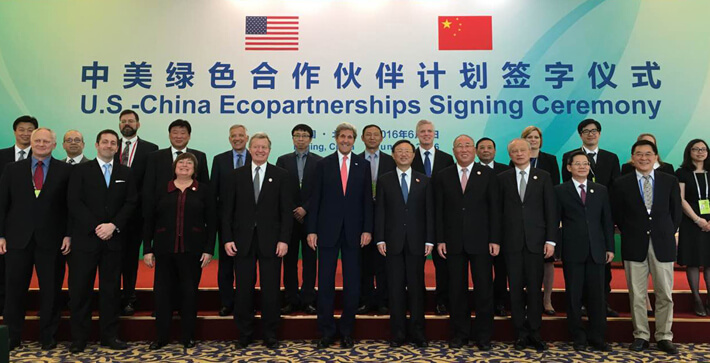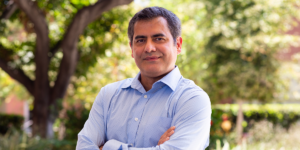
The participating MOU signatories of the US-China Ecopartnership, including Dean Yortsos and Bayeco Chairman and CEO Wei Wei, pose with U.S. Secretary of State John Kerry and U.S. Ambassador Max Baucus, in Beijing. Photo courtesy of Bayeco
A partnership between the USC Viterbi School of Engineering and the Bay Environmental Technology Corp (Bayeco) has been selected by the US Department of State and the Chinese government for membership in the US-China EcoPartnership program. The official signing ceremony took place in Beijing during the 8th US-China Strategy and Economy Dialogue (SED) at which U.S. Secretary of State John Kerry, Chinese State Councilor Jiechi Yang, and several high level US and Chinese Government officials were present .
Established under the U.S.-China Ten Year Framework on Energy and Environment Cooperation (TYF), The US-China EcoPartnerships program is the formal collaboration between U.S. and Chinese stakeholders who work on clean energy, climate change, environmental protection and sustainable development. The USC Viterbi-Bayeco partnership will focus on eliminating particles that contribute to acid rain, smog and create greenhouse gases, by reducing harmful emissions produced from coal-fueled plants and other industries.
The research team will develop a number of methodologies to reduce NOx and SOx emissions from stationary resources. In addition, the USC-Bayeco team will work to recover volatile organic compounds, develop oxidation technologies, recover vapors and also be involved in a number of other clean technologies for energy and water with the goal of minimizing of emissions and various contaminants as well as membrane separation and absorption combination technologies.
USC Viterbi and Bayeco have been collaborating on Clean-Tech initiatives for several years. The new opportunity offered by the EcoPartnership will expand the depth and width of the partnership, especially in the areas of industrial and domestic coal-fired energy devices, such as coal-fired power plants and boilers.
“I am very pleased that the US Department of State and the Chinese Government have selected the USC-Bayeco team as one of six in the US – China EcoPartnership this year. USC Viterbi technology and Bayeco know-how will help address and combat important air pollution challenges in China and in the world in general. We are looking forward to this exciting task ahead for the benefit of millions of people,” said USC Viterbi School of Engineering Dean Yannis C. Yortsos.
“Clean air is one of the top priority areas which U.S. and China could collaborate and benefit each other. Given the strong endorsement from the U.S. and the Chinese Government, we believe it will greatly help us to develop and commercialize more green technologies. We’re very excited about this new commitment,” said Bayeco Chairman and CEO Wei Wei.
Significant Reductions in 5-10 Years
USC –Bayeco anticipates that new technology and devices developed through this collaboration will be deployed in coal-fired energy devices, petroleum refineries, petrochemical factories, car painting and surface coating shops, and others. USC-Bayeco estimates that with the technology developed, more than one million tons of VOCs (volatile organic carbons) and NOx emissions per year could be reduced.
Published on June 7th, 2016
Last updated on March 10th, 2017









